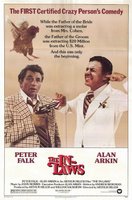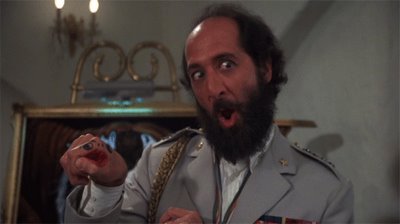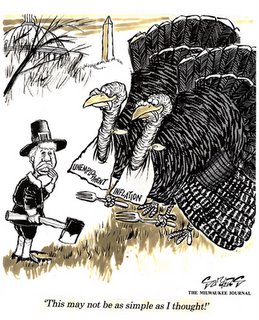The In-Laws
Banana republics and tin-pot dictators: if there is a most stereotypical stereotype of Latin America, it is undoubtedly this. And though I'm interested in, by contrast, the diversity of the ways in which Latin America figures on screen, there's no point denying that this particular image does crop up with some regularity.
But the image of the banana republic is less a comment on Latin America, than it is a symptom of the fact that so many movies that are concerned with governance (in whatever form) find a Latin American detour to be a useful, perhaps necessary, device. Latin America serves as a frame within which to consider issues of corruption, bureaucracy, and power that are general, rather than specific to any one country--or that, if they are specific, are if anything more specifically identified with the United States.
 Take the Peter Falk / Alan Arkin comedy vehicle The In-Laws. This is, in essence, a comedy that revolves around the difficulty of interpretation: Arkin's character Sheldon Kornpett (a straight-laced New York dentist) is never sure quite whether or not to believe the tall tales told by his future father-in-law, Falk's Vince Ricardo a shady... well, a shady what? Businessman, mobster, madman, CIA agent?
Take the Peter Falk / Alan Arkin comedy vehicle The In-Laws. This is, in essence, a comedy that revolves around the difficulty of interpretation: Arkin's character Sheldon Kornpett (a straight-laced New York dentist) is never sure quite whether or not to believe the tall tales told by his future father-in-law, Falk's Vince Ricardo a shady... well, a shady what? Businessman, mobster, madman, CIA agent?
The first indication that Vince may be either unhinged or dishonest--and surely not what he appears to be--comes in his account of his time working in Guatemala.
Over dinner he describes, in all apparent seriousness, a tale of tse-tse flies the size of eagles carrying off native children: "The enormous flies flapping slowly away into the sunset, small brown babies clutched in their beaks." Kornpett's response is incredulity and amazement: "Beaks? Flies with beaks?" "The size of them," comes the deadpan reply. "I was stunned. Appalled."
Convinced by his wife and daughter to give Vince a little more slack, Sheldon soon finds himself en route to the Latin American republic of Tijada, which we are told is a tiny island just south of Honduras, there to meet a General García and hand him US Treasury plates with which to print high-denomination dollar bills and so destabilize the world economic system.
García proves to be the most caricatured extreme of a crazed dictator: he talks to (and waters) his make-up embellished hand, and proudly shows off his art collection of kitsch black-silk nature paintings, as well as the flag that he has had designed for the Republic, on which is emblazoned a portrait of himself with a local prostitute. But García is also distinguished by his scar: a "Z" scratched on his cheek. Inscribed with the mark of Zorro, then, he's also firmly placed within Hollywood's own versions of Latin misrule.

But if García incarnates a state form that has gone wild, then he does so spectacularly, hypervisibly. Vince tells Sheldon that he shouldn't comment on what he sees: "Don't say anything about his scar . . . You'll see it but don't say it, you follow my drift? The other thing, be sure to compliment his art collection." But when they are face to face, the sight is too overwhelming for the impressionable dentist, whose first words on seeing the general's cheek are: "A Zee? A Zee?"
On the other hand, this hypervisibility is merely the obverse of the invisible, almost indiscernible way in which the US state has also gone wild. For Vince is indeed, it turns out, in the pay of the CIA, going about his business for Uncle Sam. His craziness is all the more disturbing because it is so hard to interpret. It isn't "in your face" in the way that it (literally) is with García. Even the straight-laced US official based in Tijada is not what he seems: he spins Sheldon a line, which we don't know whether or not we can or should take at face value.
Moreover, those who serve the US state are no less corrupt than the functionaries of Tijada's Banana Republic: Ricardo and Kornpett walk away from their escapade with a cool $5 million each, some of which, true to stereotypical Latin form, they immediately pass on to their nearest and dearest. But this nepotism is hidden, underhand, a far cry from García's delight in having bridges named after him for no other reason than he can.
Of course, The In-Laws has few pretensions to seriousness: it's a light-hearted odd-couple comedy. But it's revealing that the means by which the evil despot is to take over the world should be though currency crisis and hyperinflation. In 1979, the various oil-price shocks (and their third-world origins) were hardly a distant memory.
 Indeed, the late 1970s were a time when Western states were particularly fragile, object of considerable suspicion. Voters would soon turn to stronger, more visible and more forceful, leaders than Carter and Callaghan. The era of Reagan and Thatcher, and so also of monetarism and fiscal responsibility, was just around the corner. At least with Ronnie and Maggie (and very much unlike Vince), you knew what you were getting into from the start.
Indeed, the late 1970s were a time when Western states were particularly fragile, object of considerable suspicion. Voters would soon turn to stronger, more visible and more forceful, leaders than Carter and Callaghan. The era of Reagan and Thatcher, and so also of monetarism and fiscal responsibility, was just around the corner. At least with Ronnie and Maggie (and very much unlike Vince), you knew what you were getting into from the start.
It's as though, ironically, a General García might seem more attractive than a Vince Ricardo, however much there is "something loveable" about such smooth-talkers on the surface.
But the image of the banana republic is less a comment on Latin America, than it is a symptom of the fact that so many movies that are concerned with governance (in whatever form) find a Latin American detour to be a useful, perhaps necessary, device. Latin America serves as a frame within which to consider issues of corruption, bureaucracy, and power that are general, rather than specific to any one country--or that, if they are specific, are if anything more specifically identified with the United States.
 Take the Peter Falk / Alan Arkin comedy vehicle The In-Laws. This is, in essence, a comedy that revolves around the difficulty of interpretation: Arkin's character Sheldon Kornpett (a straight-laced New York dentist) is never sure quite whether or not to believe the tall tales told by his future father-in-law, Falk's Vince Ricardo a shady... well, a shady what? Businessman, mobster, madman, CIA agent?
Take the Peter Falk / Alan Arkin comedy vehicle The In-Laws. This is, in essence, a comedy that revolves around the difficulty of interpretation: Arkin's character Sheldon Kornpett (a straight-laced New York dentist) is never sure quite whether or not to believe the tall tales told by his future father-in-law, Falk's Vince Ricardo a shady... well, a shady what? Businessman, mobster, madman, CIA agent?The first indication that Vince may be either unhinged or dishonest--and surely not what he appears to be--comes in his account of his time working in Guatemala.
Over dinner he describes, in all apparent seriousness, a tale of tse-tse flies the size of eagles carrying off native children: "The enormous flies flapping slowly away into the sunset, small brown babies clutched in their beaks." Kornpett's response is incredulity and amazement: "Beaks? Flies with beaks?" "The size of them," comes the deadpan reply. "I was stunned. Appalled."
Convinced by his wife and daughter to give Vince a little more slack, Sheldon soon finds himself en route to the Latin American republic of Tijada, which we are told is a tiny island just south of Honduras, there to meet a General García and hand him US Treasury plates with which to print high-denomination dollar bills and so destabilize the world economic system.
García proves to be the most caricatured extreme of a crazed dictator: he talks to (and waters) his make-up embellished hand, and proudly shows off his art collection of kitsch black-silk nature paintings, as well as the flag that he has had designed for the Republic, on which is emblazoned a portrait of himself with a local prostitute. But García is also distinguished by his scar: a "Z" scratched on his cheek. Inscribed with the mark of Zorro, then, he's also firmly placed within Hollywood's own versions of Latin misrule.

But if García incarnates a state form that has gone wild, then he does so spectacularly, hypervisibly. Vince tells Sheldon that he shouldn't comment on what he sees: "Don't say anything about his scar . . . You'll see it but don't say it, you follow my drift? The other thing, be sure to compliment his art collection." But when they are face to face, the sight is too overwhelming for the impressionable dentist, whose first words on seeing the general's cheek are: "A Zee? A Zee?"
On the other hand, this hypervisibility is merely the obverse of the invisible, almost indiscernible way in which the US state has also gone wild. For Vince is indeed, it turns out, in the pay of the CIA, going about his business for Uncle Sam. His craziness is all the more disturbing because it is so hard to interpret. It isn't "in your face" in the way that it (literally) is with García. Even the straight-laced US official based in Tijada is not what he seems: he spins Sheldon a line, which we don't know whether or not we can or should take at face value.
Moreover, those who serve the US state are no less corrupt than the functionaries of Tijada's Banana Republic: Ricardo and Kornpett walk away from their escapade with a cool $5 million each, some of which, true to stereotypical Latin form, they immediately pass on to their nearest and dearest. But this nepotism is hidden, underhand, a far cry from García's delight in having bridges named after him for no other reason than he can.
Of course, The In-Laws has few pretensions to seriousness: it's a light-hearted odd-couple comedy. But it's revealing that the means by which the evil despot is to take over the world should be though currency crisis and hyperinflation. In 1979, the various oil-price shocks (and their third-world origins) were hardly a distant memory.
 Indeed, the late 1970s were a time when Western states were particularly fragile, object of considerable suspicion. Voters would soon turn to stronger, more visible and more forceful, leaders than Carter and Callaghan. The era of Reagan and Thatcher, and so also of monetarism and fiscal responsibility, was just around the corner. At least with Ronnie and Maggie (and very much unlike Vince), you knew what you were getting into from the start.
Indeed, the late 1970s were a time when Western states were particularly fragile, object of considerable suspicion. Voters would soon turn to stronger, more visible and more forceful, leaders than Carter and Callaghan. The era of Reagan and Thatcher, and so also of monetarism and fiscal responsibility, was just around the corner. At least with Ronnie and Maggie (and very much unlike Vince), you knew what you were getting into from the start.It's as though, ironically, a General García might seem more attractive than a Vince Ricardo, however much there is "something loveable" about such smooth-talkers on the surface.
